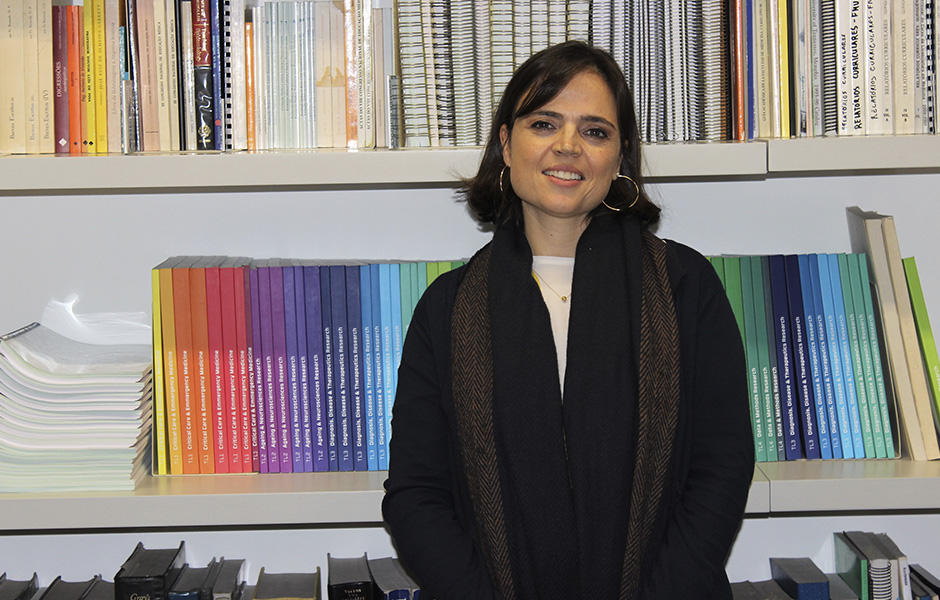Elisa Keating is a principal investigator of ProNutri, a multidisciplinary research group at CINTESIS which gathers together different national institutions aiming to identify the mechanisms and the causes of chronic diseases progression in which food plays a significant role.
She was born in 1977, in Cedofeita, in the city of Porto. The surname Keating comes from the paternal great-grandfather, of Irish nationality. The family is a constant inspiration.
She is privileged to have “a huge and very solid family structure”, based on a nucleus well established by her husband and children, complemented by her parents (her father is a doctor and her mother is a teacher), brothers, nephews, uncles, cousins and, at the top of the chain, by her grandmother, 102 years-old, who give her a sense of belonging and peace of mind.
She graduated in Biochemistry from the Faculty of Sciences of the University of Porto (FCUP) in 1999. She then did Erasmus in England in the last year of the course, but wanted to return to her roots. She had not yet finished her undergraduate degree when she began lecturing at the Faculty of Medicine of the University of Porto (FMUP), where she currently works as an assistant professor.
She has always wanted to conciliate teaching with health research. The opportunity came in 2000 with a research grant on transmembrane transport on the human placenta, which eventually became the subject of her PhD in Human Biology, completed in 2008 under the supervision of Fátima Martel and Isabel Azevedo.
“I believe that scientific research gives cohesion to the knowledge that the teacher conveys to the students and that the exercise of teaching trains the researcher to convey the knowledge he or she creates. Research and teaching are therefore, very interdependent. However, this ideal is not always easy to achieve.” She says.
She was a postdoctoral fellow at FMUP between 2008 and 2013 and a researcher at the Portuguese Catholic University between 2013 and 2015 in the area of metabolism and fetal programming of the disease in adults.
After that period, she joined CINTESIS and the ProNutri group. She was part of the IoGeneration team, developed within the scope of this Unit and financed with more than 400,000 euros by EEA Grants. The project was responsible for the characterization of the iodine status in children from Northern Portugal.
She is currently leading IoMum, a CINTESIS project that aims to evaluate the state of iodine in Portuguese pregnant women. The study is taking place at the University Hospital Center of São João and will soon be extended to other regions of the country.
What is your 1-Year Ambition?
In Portugal, there is a cloud surrounding the state of iodine in pregnant women that needs to be dissipated. There is a Guidance from the Directorate-General for Health from 2013 to supplement iodine in pregnancy, but we do not know what has changed since then. We do not know, for example, what is the impact of iodine supplementation throughout pregnancy. We know there are doctors who recommend and others who are afraid to generalize this recommendation, even though they recognize that iodine is indispensable for the baby’s development, especially cognitive development. We still do not understand how, given the urgency of this evaluation, we have not had funding. We continue to try, but we are working, even if funding comes later.
What is your 10-Year Ambition?
ProNutri is ideally suited to study the relationship between nutrition and the development of pathologies in critical time windows of life because it brings together researchers linked to prenatal / pregnancy, pediatric age and ageing. My main aim is to move towards a greater cohesion of our research group and well-defined research lines. This is achieved through the promotion of meetings, but especially with funding, which I hope will become a more structured reality in the area of Nutrition Sciences.
How is life beyond teaching and research?
I have made an effort to leave the computer at work and to be at home more dedicated to my family. I like to dedicate quality time to my children (a 15-year-old and a 10-year-old), I like to walk in the nature and to spend weekends playing basket or volleyball (depending on the time), joining generations. In the few time I have alone, I go to the gym or I go running. I’ve always been an active person. I also really enjoy cooking for the family and they like my food very much. It’s a combination that works very well (laughs).

